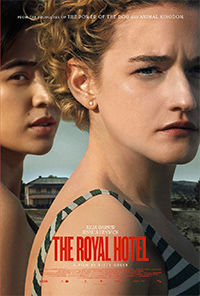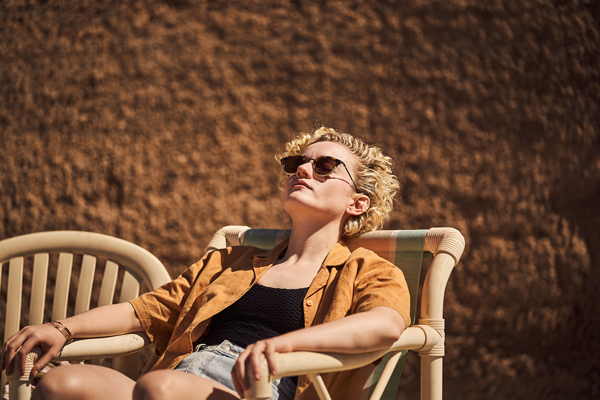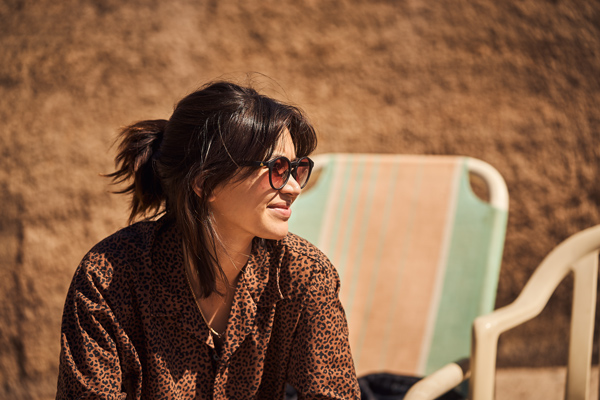Kitty Green Takes her ‘Assistant’ To The Outback in Sunburn Sizzler
 After exploring the ways in which workplace rape culture enables predators like Harvey Weinstein to operate unabated in The Assistant, director Kitty Green finds new dimensions to the same theme all the way on the other side of the world in The Royal Hotel. Moving from the cloistered anxiety of a cubicle, the filmmaker kicks open the aspect ratio to capture the widescreen beauty of the outback in a spiritual sequel that finds a seething menace behind “Come and say g’day.”
After exploring the ways in which workplace rape culture enables predators like Harvey Weinstein to operate unabated in The Assistant, director Kitty Green finds new dimensions to the same theme all the way on the other side of the world in The Royal Hotel. Moving from the cloistered anxiety of a cubicle, the filmmaker kicks open the aspect ratio to capture the widescreen beauty of the outback in a spiritual sequel that finds a seething menace behind “Come and say g’day.”
In the midst of backpacking across Australia, the fun comes to an abrupt halt for Hanna (Julia Garner) and Liv (Jessica Henwick) when after a night of clubbing, the latter finds herself completely out of cash. To raise enough money to keep traveling, the pair take a job slinging drinks at The Royal Hotel, but the glamor is in name only. It’s a bar in a remote mining community filled with geologists, riggers, and blow-ins and they’re warned they’ll have to put up with “a little male attention.” As Green will make clear, the line between attention and assault, when accelerated by alcohol, can quickly evaporate.

The watering hole is run by the booze-sozzled Billy (Hugo Weaving) whose partner Carol (Ursula Yovich) mans the kitchen in the back. The young women are given ramshackle apartments upstairs, but they’ll be spending most of their time behind the counter keeping the drinks coming for a series of regulars including Matty (Toby Wallace), Dolly (Daniel Henshall), and Teeth (James Frecheville). With nothing else to do in the middle of nowhere, nights are not half measures at The Royal Hotel. Evenings often turn rowdy and occasionally frightening as Hanna and Liv are almost exclusively the only women their age in the company of men whose micro-aggressions often seem on the edge of turning openly violent.

Playing out like a sister film to Ted Kocheff’s cult Ozploitation sizzler Wake In Fright, Green similarly displays how moral rot can run through an entire community. The script, co-written by Green and Oscar Redding, does excellent work in showing the many faces behind which misogyny hides. There’s the obvious transparency of someone like Dolly, who demands attention and is personally and terrifyingly affronted when he doesn’t receive it. Meanwhile, we see how archetypes like The Nice Guy (Matty) and the problematic Protector (Teeth) turn what appears to be acting in the best interests of Hanna and Liv into serving their own ends. But there are other clues too — the way in which casual slurs are weaponized or how Matty treats Australian Indigenous vegetable vendor Tommy (Baykali Ganambarr) or reacts to Norwegian tourist Torsten (Herbert Nordrum) — and when working in conjunction with each other, when continually downplayed and excused, it’s only a matter a time before men who ask for what they want take what they feel they’re owed.
Operating with a calculating, gripping control of tension that plays more searingly sinister than sensational, Green and Redding up the ante by pressure testing Hanna and Liv’s united stand. Where Hanna’s alarm bells go off early, Liv’s minimizing of the mens’ action, even as incidents escalate, speaks to her experience of this behavior being normalized. Perhaps it’s easier to see these men as broken, needing fixing, than reckoning with a truth that’s far simpler, and more unnerving.
The fabric of The Royal Hotel will certainly spark discussion — about consent, male gaze, and sexual assault — but its position is clear and frankly, unshakeable. However, it’s the film’s ending that’s the boldest statement by Green. It’s an exclamation point that mirrors Thelma & Louise in its transformative effect on Hanna and Liv, offering a scorched earth solution to a problem where conversation hasn’t been cutting it.
Reviewed on September 7th at the 2023 Toronto International Film Festival – Gala Presentations Programme. 81 Mins.
★★★★/☆☆☆☆☆


